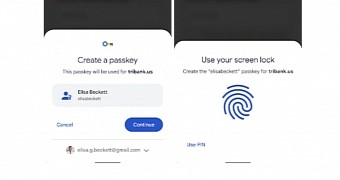The world is slowly but surely migrating away from passwords, and now Google is making a huge step in this direction by bringing passkey support to Android and Chrome.
Thanks to the new announcement, users can create their very own passkeys on Android devices and then sync them through the Google Password Manager. At the same time, developers can create passkey support and implement it into their websites, with users then allowed to use them through Chrome.
The passkey support is currently available in Chrome Canary, and Google says developers need to register for the Google Play Services beta to get access to the feature early. No specific ETA has been provided as to when passkey support is going live for production devices, but Google says this should happen later this year.
“Passkeys follow already familiar UX patterns, and build on the existing experience of password autofill. For end-users, using one is similar to using a saved password today, where they simply confirm with their existing device screen lock such as their fingerprint. Passkeys on users’ phones and computers are backed up and synced through the cloud to prevent lockouts in the case of device loss. Additionally, users can use passkeys stored on their phone to sign in to apps and websites on other nearby devices,” Google explains.
Google is also planning to bring passkey to Android apps with a new API, and at first glance, the first release could also take place later this year.
“Our next milestone in 2022 will be an API for native Android apps. Passkeys created through the web API will work seamlessly with apps affiliated with the same domain, and vice versa. The native API will give apps a unified way to let the user pick either a passkey or a saved password. Seamless, familiar UX for both passwords and passkeys helps users and developers gradually transition to passkeys,” the search giant notes.

 14 DAY TRIAL //
14 DAY TRIAL //